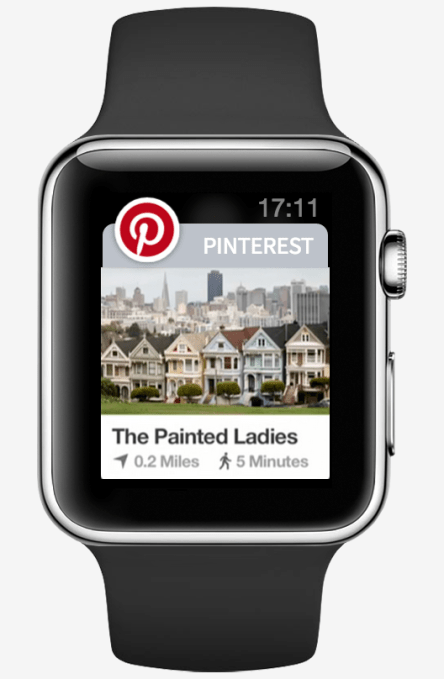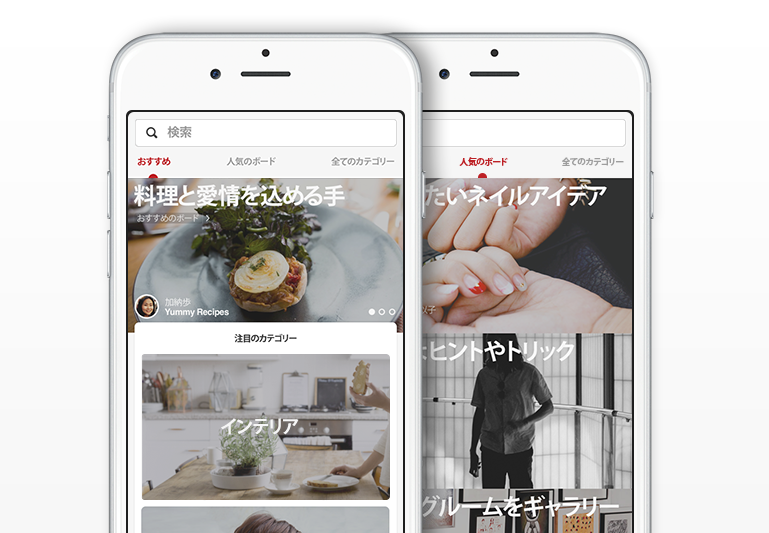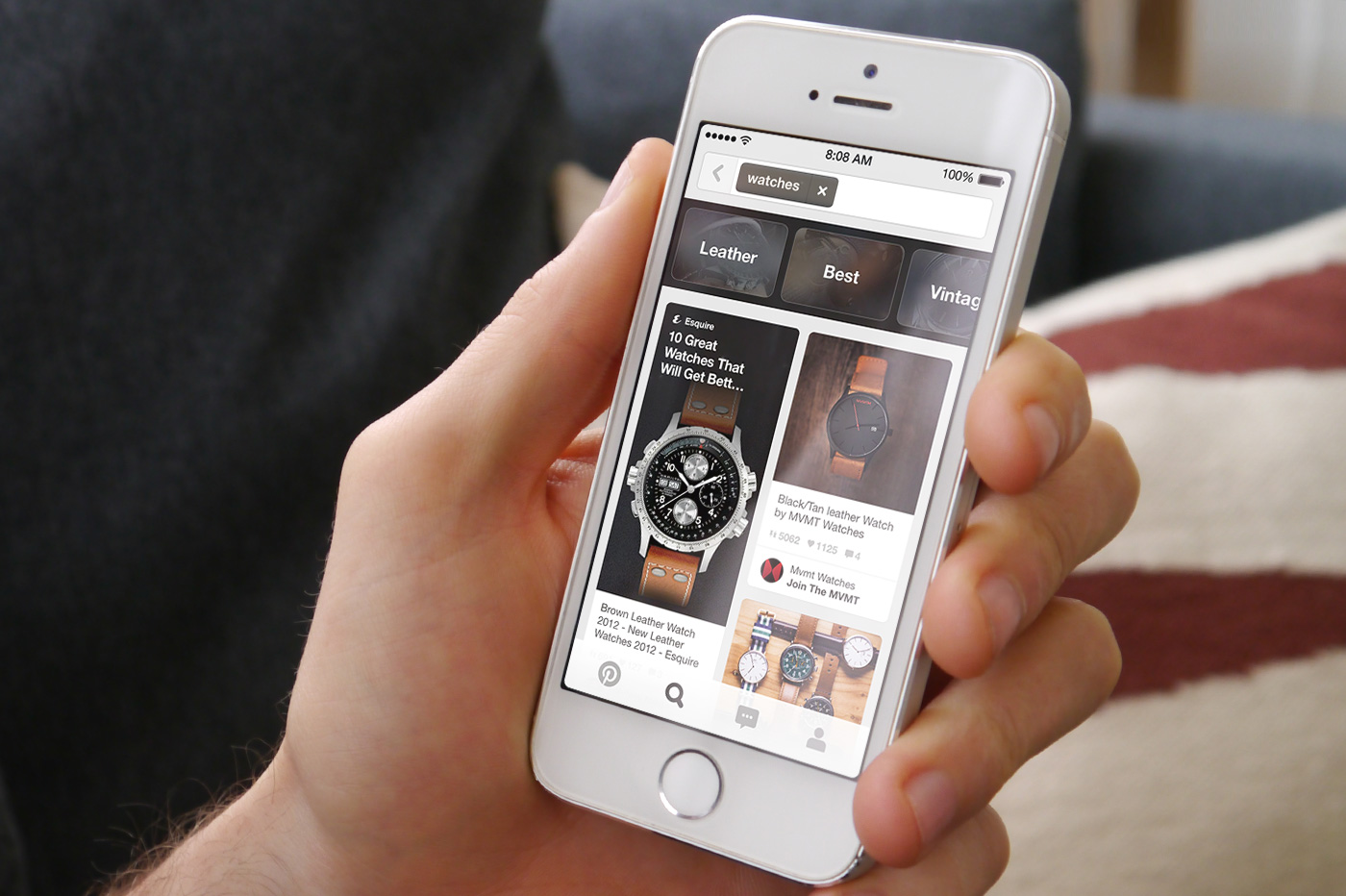 As part of a larger story about Pinterest’s Jumpstart program — a new experiment in its international expansion — I sat down with Pinterest co-founder Evan Sharp to talk about the company and its current goals.
As part of a larger story about Pinterest’s Jumpstart program — a new experiment in its international expansion — I sat down with Pinterest co-founder Evan Sharp to talk about the company and its current goals.
Our conversation wasn’t just restricted to the company’s international ambitions, though. We spoke at length about how Pinterest is structured internally, what they’re looking for and how they are thinking about the Apple Watch. I also had a chance to ask him about the current state of the tech industry and San Francisco.
Below is a lightly edited transcript of our conversation.
TechCrunch: How would you describe Pinterest today?
Evan Sharp: Our public description, a visual bookmarking tool, tends to resonate with people. That’s why we use it. When we talk to the tech press we tend to describe it as a company solving a discovery problem. But if you try to use that language with someone learning Pinterest, they don’t understand what you’re talking about. It’s like before people used Google, no one knew what a search engine was. If you go to market and say use a search engine, you’d say, ‘what the hell is that?’
TechCrunch: How does usage differ across platforms?
Sharp: We like to say pins are objects, They’re digital representations — every pin is a link. “Link” is a kind of browser term, but what we’re trying to say is behind almost all of the interesting and useful stuff on Pinterest is more information, and something you can do [with that information]. What you do with what you’ve saved changes depends on which platform you are on. On the larger screens, we see people spending longer session times and using power features. On the phone people do that as well, but there are more sessions, and they are shorter. We see people clicking through and browsing things they saved. The phone is really just a way to realize people do the things that they are discovering rather than just find them in our digital service.
TechCrunch: Where does the Apple Watch fit in to all of this?
Sharp: I haven’t used the [Apple Watch]; I just ordered one. I don’t think the watch will be as transformative as the phone is for Pinterest — but, I could be wrong. It’s just an extension of what you do with the phone in a more natural way. Apple’s proven to be really good at taking what we’re capable of with technology and making it useful and solve human problems. One trend we do see, as we develop more technology, the devices are more naturally ingrained in our lives every day. The watch is an extension of that. Instead of taking my phone out, it’s more natural to a human to look at a wrist.
 TechCrunch: How is Pinterest thinking about the new touch points on a device like the Watch, like force touch?
TechCrunch: How is Pinterest thinking about the new touch points on a device like the Watch, like force touch?
Sharp: I think… We’re not anxiously awaiting the next thing. I’d love to have a skunkworks team thinking about the next device. The reason we’re not all over it is it takes a while for it to reach any scale, and that’s important to our business. There’ll be a natural point, say force touch comes out for the iPhone 7, that were thinking about the model on iOS. With iOS releases we rebuild our app, and I assume we’ll do that with the next one. It may or may not take advantage of those new inputs.
TechCrunch: When looking at the team in Japan, what are some of the big areas of focus there?
Sharp: We’ve sent a team for the first time, they’ve been there for four weeks now, and so we’re in the process of figuring that out. The biggest product thing for international is connecting you with local people, local content. Even in the United Kingdom, when you save a recipe, it’s an American recipe, and so for the more actionable stuff it needs to be usable wherever you live. That’s obvious, but there’s a lot of stuff to do at scale with how we serve recommendations.
In terms of the user interface itself, we don’t know yet. Visual imagery is a sort of useful language. Other apps, like the clones of Pinterest in China (which there are a lot of), they do use different user-interface patterns. The languages in Japan and China are denser. There are subtle things we might change. But I don’t see us fundamentally rethinking the value proposition of the app — but, I mean, we may change our mind.
TechCrunch: How does performance fit into this?
Sharp: We think of speed as a feature; that’s obvious. If it’s not fast, it’s not useful. It’s not gonna work. There’s a point at which it can’t get faster because of the laws of physics. We’re already pretty fast internationally. I don’t think that’s gonna make or break us. It’s really about what we’re doing to build awareness for people in places that have never heard of it.
TechCrunch: What are some examples of that?
Sharp: Right now we’re focused on the U.K., France, Germany, Japan and Brazil — Brazil’s the newest one. We don’t really feel like we know what’s unique to that market yet, but we have two people there now. Different countries are very different. Some countries are very mobile, some countries have poor Internet connectivity. We’re in the Philippines, but it’s very different tech. It’s not very mobile-saturated; it’s still very desktop web. It’s counterintuitive and has to do with how mature the market is. Where we focus attention of the product needs to be tailored to what people are going to do.
TechCrunch: How would you consider that in a place like Africa?
Sharp: We haven’t really focused on Africa yet.

TechCrunch: What does the internal conversation look like when you are looking at a new product or use case?
Sharp: The process itself is very prototype-driven. Say we do a watch app; it’ll be a prototype-driven conversation. We take some of our top engineers that are interested in the product, we’ll have a conversation, and they’ll build a prototype. I think that’s how we get the best products.
There’s this textbook way of building products where you identify a problem, build a strategy and go execute. But if you want greatness, you need to work from the people who are executing back to the strategy and vision to what you’re building. People who deeply understand the tech capabilities and limitations, they should be having the conversation of what the vision is. A prototype is a very rich way of understanding what’s possible.
TechCrunch: When you’re sitting down to interview a potential candidate, what are you looking for?
Sharp: Honestly, it hasn’t changed, though we’ve gotten more confident and specific. There are hallmarks — they are really smart and they have passion for technology and its capability. All that is kind of a given in [Silicon Valley]; this is a technological place. What’s specific to Pinterest, which might be more interesting, is… our core company value is “knitting.” It’s our phrase to explain how we cross different disciplines and learn each others’ language to build things.
We want employees teaching each other what they know. We’re tying to build a company so each person can achieve at a very high level — we’re not just the engineering company or the design company.
TechCrunch: What are some of the last frontiers of the Internet that you have an eye on?
Sharp: Right now we’ve worked on discovery for a few years; we feel we’ve made progress but we have so much more to do. It should be better and better, more personal, and we’re getting there. We serve 1.5 trillion recommendations a year. Part of that is, we have to be sure that the Pinterest experience feels like this catalog that’s hand-picked for you.

Another part is actionability — I think there’s just a world of info and APIs and stuff that we can build one day that takes all these visual bookmarks and makes them actionable things, and not just links. We did this partnership with Apple. That’s a template I think you can think about for where we’re taking pins, and one way we’ll be evolving pins.
Then of course I think there’s always focus on growth — like the growth we talked about internationally.
TechCrunch: How do you feel about the term growth hacking — not a fan?
Sharp: No, I don’t like the term.
TechCrunch: What term would you use?
Sharp: Making your product more useful and more relevant to people? I think growth teams are incredibly important and vital, but the danger of something with growth hacking is locally optimizing and making it 1 percent to 5 percent better. A product like Pinterest, if we start locally optimizing, we’re way behind. We need to be globally optimizing, rather than worrying about each little piece.
TechCrunch: How does that fit into the way Pinterest is designed internally?
Sharp: The way we’re organized, we have a very capable growth team. That’s their job. The new user experience, what happens and lands on Pinterest — we have to seriously think about how we make that on-boarding process seamless. There is a team that does work that way, but if you only work that way, that’s a problem. We have a team on discovery, on saving for the first time, a team on pins, on making it more actionable, and they’re working in a holistic way. We have to consider how to take Pinterest and evolve it into something more useful rather than making it complicated.
It seems like, in this new world of apps, things are centralizing pretty quickly. If the Internet was a library, the apps are television Evan Sharp
TechCrunch: So how do you guys think about the onboarding process, given some other apps out there that have been having issues?
Sharp: It’s tough — one of our country managers described it, there are a little bit of apps that are like junk food. Pinterest isn’t junk food; Pinterest is learning to code. It’s fulfilling, it’s useful, it’s more complicated than clickbait. When we onboard, we have to kind of incept you to why discovery is kind of useful for your life. Pinterest is a tool that’s so broadly useful and relevant, teaching people how they can use it is one of the most important steps.
TechCrunch: What do you think of platforms like Refinery29?
Sharp: I will say, it seems like, in this new world of apps, things are centralizing pretty quickly. If the Internet was a library, the apps are television. There are a few channels with a lot of people. Most are social, the companies that are not those core TV channels but creating interesting stuff need to find a way to plug in.
It’s a metaphor — the browser web was very hyperlinked, it was interconnected, there was room for far more, and people used way more websites than they will apps. Now, it’s just a new world. People are spending all their time in the top 20 apps, most are about socializing, messaging friends and such. We see China’s ahead in a lot of ways in that example. The apps are all big social apps. Those apps are trying to eat up other apps or websites.
TechCrunch: Like something like WeChat?
Sharp: WeChat’s built all these other apps; it’s because they have the eyeballs. It’s hard to compete. If you’re a lifestyle pub, not a core TV channel, you have to leverage the capability of those apps to survive.
TechCrunch: How do you feel about entering markets where there is some hostility or major competition?
Sharp: We don’t think about competition very much. We don’t really have a lot of direct competitors. I mean, in China there are a bunch of guys that cloned us. We picked the places we picked because they’re mature markets, they’re countries that lead their regions culturally. It feels like, if we can get the markets were focused in, we’ll be in a good position to turn our attention to new ones.
TechCrunch: Is that because of some cultural overlap?
Sharp: France and the U.K. are the same way. Japan is interesting, for example, because they lead their region culturally.
TechCrunch: And France?
Sharp: We’re actually doing really well in France. You would probably expect that given the things they value — food, drink, fashion.
TechCrunch: International is going to be bigger than the U.S. at some point, right?
Sharp: We don’t talk about numbers at all; we should probably start doing that. But when I look out in the future, the majority of our users will be outside of the U.S. There are a lot of people outside the U.S.
TechCrunch: As Pinterest goes forward, do you see an opportunity for more native content on the platform? Say, a recipe that exists only on Pinterest?
Sharp: We don’t do that today, I could imagine us doing that in the future. It would make sense; the mobile web is a really bad experience, but it’s not something we’re going to talk about right now. A Pinterest representative later told me that about 2 percent of all content is user-generated.
TechCrunch: How many hours do you spend working on Pinterest every week?
Sharp: I spend all week on work, basically from when I wake up to when I go to bed. On the weekend I try to disconnect, and maybe drive somewhere in California.
TechCrunch: What do you think of the current state of San Francisco, relating to things like the housing crisis?
Sharp: I think it sucks. It’s just tough. It’s a tough problem. I think the tech industry moves so fast that since I’ve lived here, the change has been and still is so dramatic. It just moves faster than governments are capable of moving. We’re in this lag time where there are new problems, and it’s gonna take years to address them, because that’s the speed of consensus.
For now it’s tough, and I feel bad for people priced out. I don’t know what to change — this city is also a hotbed of innovation technology, and other cities would die to have our problems. We should all feel very lucky to work in this industry — one rich with money, really impactful and fun. It’s the best qualities of a job in one.
The tech industry moves so fast that since I’ve lived here, the change has been and still is so dramatic. It just moves faster than governments are capable of moving. We’re in this lag time where there are new problems, and it’s gonna take years to address them, because that’s the speed of consensus. Evan Sharp
But I think it’s a complicated situation, and all I can really do day-to-day is think how we make Pinterest a positive force in the city. We’ll create problems, probably ones we don’t even realize we’re creating, but hopefully we’ll solve some of those problem. We’re still a little early to spend time outside of the business; we’re a bit superstitious about doing stuff outside of the work until we have a self-sustaining business given we’re venture capital-backed with someone else’s money. But as we mature as a company, we’ll do a lot of stuff in the community, and hopefully not on a surface level but on a real way.
TechCrunch: How do you think about that when you look at hiring people at Pinterest?
Sharp: It turns out you can hire nice people who are really effective. There’s this idea in [Silicon Valley] that aggressiveness equals effectiveness, but that’s not true. It can be good or bad. We hire nice people who are very empathetic and self aware. It’s a good company — I’m kind of biased, though.
TechCrunch: Why do you feel that, in tech in particular, that the industry is kind of intolerant of letting older companies die gracefully?
Sharp: Fostering truly talented creativity and building a scaled organization is a diametrically opposed way of managing. I think the tech industry has been dominated by engineers, and that’s not bad, but it’s a very operational thing even though it can be creative. There are few large companies that maintain creativity because the language of business is an objective language.
Unfortunately most of the best products in the world — just like movies and entertainment — that spark in the beginning is subjective. Design is a really good example. Designers and the companies they work with, they tend to wear objective language clothing. That’s how they interface with other people. They hide the subjective because they don’t know how to talk about it without coming across as un-rigorous. The reality is most of the best stuff is a combination of subjective and objective ways of working and thinking, and it’s almost impossible to maintain that way of working in a large organization.
When I got into managing this company, I read the essential management books. And all of them were about building widgets at scale. It’s not that this stuff is bad. It’s an incredibly important way of working. You can’t build things without that, but you have to make room for creativity and talent and ways of working that are subjective. That’s my point, and it sounds soft because we don’t talk about it. That’s why big companies can’t survive. Maybe I don’t know what I’m talking about, but maybe I do.
TechCrunch: Where do you look for inspiration?
Sharp: I’m the most inspired by other creatives at scale. I’m inspired by Pixar, Jony Ive, those are the companies and people who do something I admire at scale. Those companies represent what I want to be. Not that we’re gonna be just like those companies, but the way they work at scale and the brand they create, that’s the brand I want to have. I think we do have it, but we need to scale it in a way that’s healthy.